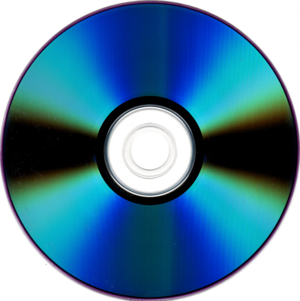Disk facts for kids
A disc (sometimes spelled disk) is usually a flat, round object. You might see them in many different places, from toys you play with to parts inside computers and even in space! The word "disc" comes from a Greek word meaning "plate" or "discus."
Contents
Discs for Music and Movies
Many discs are used to store sounds, videos, and other information. These are often called optical discs because they use lasers to read and write data.
Compact Discs (CDs)
The Compact Disc (CD) was invented in the late 1970s and became very popular in the 1980s. CDs are about 12 centimeters (4.7 inches) wide. They can store about 80 minutes of music or 700 megabytes of computer data. CDs replaced older gramophone records, which were also disc-shaped.
Digital Versatile Discs (DVDs)
The Digital Versatile Disc (DVD) came out in the mid-1990s. DVDs look a lot like CDs but can hold much more information. A single-layer DVD can store 4.7 gigabytes of data, which is enough for a full-length movie. Double-layer DVDs can hold even more. DVDs were a big step forward for home entertainment.
Blu-ray Discs
Blu-ray Discs were introduced in the early 2000s. They can store even more data than DVDs, typically 25 gigabytes on a single layer and 50 gigabytes on a dual layer. This extra space is perfect for high-definition movies and large video games. Blu-ray discs get their name from the blue laser used to read them.
Other Media Discs
- Laserdiscs were an early type of optical disc used for movies before DVDs.
- MiniDiscs were smaller discs used for recording audio, popular in the 1990s.
Discs in Computers
Computers use different types of discs to store information, like your games, photos, and documents.
Hard Disks
A hard disk (or hard drive) is a main storage device in most computers. It contains spinning platters coated with magnetic material. A read/write head moves over these platters to store and retrieve data very quickly. Hard drives can store huge amounts of information, from hundreds of gigabytes to many terabytes.
Floppy Disks
Floppy disks (or diskettes) were common in the 1980s and 1990s. They were much smaller than hard drives and could be removed from the computer. Floppy disks stored only a small amount of data, usually 1.44 megabytes. They were used to save files or install small programs. Today, they have mostly been replaced by USB flash drives and cloud storage.
Discs in Science and Space
Discs aren't just found on Earth; they are also important shapes in space!
Accretion Disks
In space, an accretion disk is a spinning disk of gas and dust that spirals inward towards a central object. This central object is often a black hole or a young star. As the material in the disk gets closer to the center, it heats up and glows brightly. Scientists study accretion disks to learn about how stars and black holes form.
Protoplanetary Disks
A protoplanetary disk is a rotating disk of dense gas and dust surrounding a newly formed star. This is where planets are born! Over millions of years, tiny dust particles in the disk clump together, slowly forming larger and larger objects until they become planets. Our own solar system formed from a protoplanetary disk.
Galactic Discs
Many galaxies, including our own Milky Way, have a disc shape. These galactic discs are flat, rotating collections of stars, gas, and dust. The stars in the disc orbit around the center of the galaxy.
Other Types of Discs
- A flying disc is a toy, often called a Frisbee. You throw it, and it spins through the air.
- The intervertebral disc is a soft cushion between the bones (vertebrae) in your spine. They act like shock absorbers and allow your back to bend.
See Also
- Discus throw, a sport where athletes throw a heavy disc.
- Disco, a style of dance music.
- Disc jockey, a person who plays music for an audience.
- Disc brake, a type of brake used in cars and bicycles.
 | May Edward Chinn |
 | Rebecca Cole |
 | Alexa Canady |
 | Dorothy Lavinia Brown |


